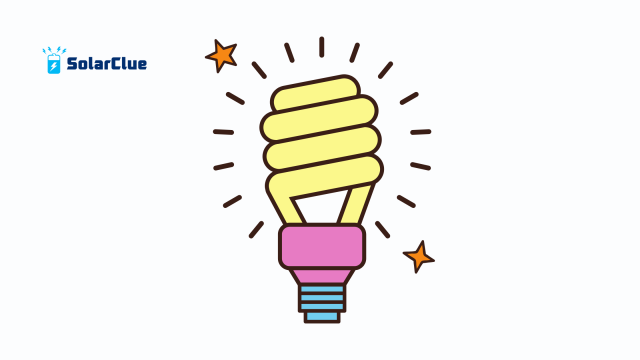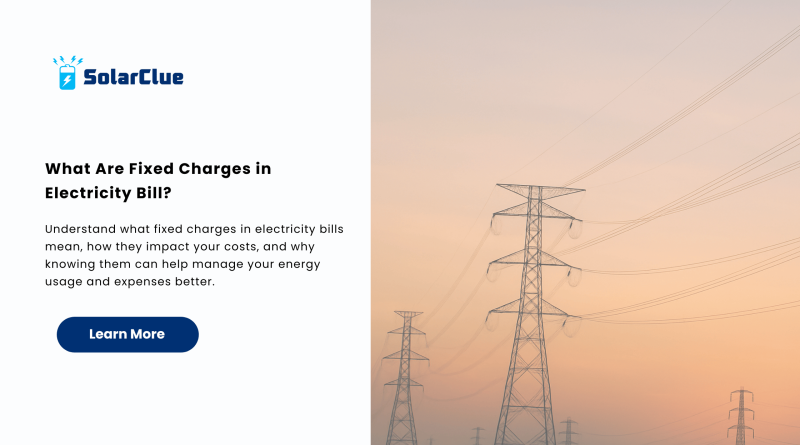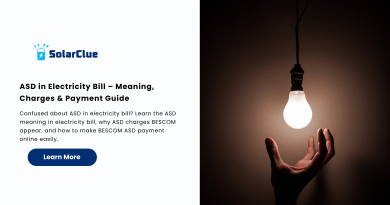What Are Fixed Charges in Electricity Bill?
When you receive your electricity bill, it often contains multiple components that determine the final amount. One of the most misunderstood components is fixed charges in electricity bill. These charges can confuse many consumers who assume they only pay for the energy they use. Understanding fixed charges helps you become an informed energy consumer and manage your expenses more effectively.
Table of Contents
- 1 What Are Fixed Charges?
- 2 Why Fixed Charges Are Applied
- 3 How Fixed Charges Differ from Energy Charges
- 4 Examples of Fixed Charges in Different States
- 5 How Fixed Charges Impact Your Total Electricity Bill
- 6 Fixed Charges in Residential vs Commercial Bills
- 7 Common Long-Tail Queries Answered
- 8 Benefits of Knowing About Fixed Charges
- 9 Tips to Optimize Your Electricity Bill Despite Fixed Charges
- 10 Government Regulations on Fixed Charges
- 11 Can Fixed Charges Increase?
- 12 Role of Sanctioned Load in Fixed Charges
- 13 Are Fixed Charges Justified?
- 14 How Solar Can Reduce Your Electricity Bill
- 15 How to Read Fixed Charges on Your Electricity Bill
- 16 Conclusion
- 17 FAQs
What Are Fixed Charges?
Fixed charges are a portion of your electricity bill that remains constant regardless of your energy consumption. These charges are levied to cover the cost of maintaining the infrastructure needed to deliver electricity to your home or business. They are not based on your usage but are instead a flat fee applied monthly.
Why Fixed Charges Are Applied
1. Infrastructure Maintenance
Utilities invest heavily in power lines, substations, meters, and other infrastructure. Fixed charges help recover these costs.
2. Administrative Costs
This includes billing, metering, and customer support services that function irrespective of your consumption.
3. Grid Reliability
Fixed charges contribute to grid upgrades and maintenance to ensure consistent electricity supply.
How Fixed Charges Differ from Energy Charges
Fixed Charges:
- Constant monthly fee
- Independent of energy usage
- Covers non-variable utility costs
Energy Charges:
- Vary based on kWh consumed
- Directly linked to your electricity usage
Examples of Fixed Charges in Different States
Depending on your location and service provider, fixed charges vary. For example:
- In Karnataka, BESCOM may charge a fixed rate based on the connected load (e.g., ₹75 for up to 1 kW)
- In Maharashtra, MSEDCL charges fixed fees per month based on usage category
How Fixed Charges Impact Your Total Electricity Bill
Fixed charges can form a significant part of your electricity bill, especially if your usage is low. While they ensure that utility companies cover their base costs, they can feel unfair to low-usage consumers.
Fixed Charges in Residential vs Commercial Bills
Residential Users:
Generally lower fixed charges but vary based on sanctioned load.
Commercial Users:
Higher fixed charges due to larger connected loads and higher maintenance.
Common Long-Tail Queries Answered
What happens if I reduce my usage?
You’ll still pay the fixed charges even if your electricity usage drops significantly.
Can I negotiate fixed charges?
No. These are regulated by state electricity boards and regulatory commissions.
Do solar users pay fixed charges?
Yes. Even if you install solar, you remain connected to the grid and pay the fixed component.
Benefits of Knowing About Fixed Charges
- Better budgeting for monthly energy expenses
- Helps compare tariffs when switching providers
- Assists in understanding electricity bill structure more clearly

Tips to Optimize Your Electricity Bill Despite Fixed Charges
- Reduce variable usage (switch to LEDs, turn off unused devices)
- Opt for time-of-day usage if applicable
- Consider solar installation to offset energy charges
Government Regulations on Fixed Charges
Every state electricity board is guided by its regulatory commission. These bodies approve fixed charges and revise them periodically based on policy and infrastructure requirements.
Can Fixed Charges Increase?
Yes. Utility companies can propose an increase during tariff revisions. Consumers can participate in public hearings to voice opinions.
Role of Sanctioned Load in Fixed Charges
Sanctioned load refers to the maximum load agreed upon with the electricity board. Fixed charges are often calculated based on this value. Higher the sanctioned load, higher the fixed fee.
Are Fixed Charges Justified?
While they may seem unfair, they are essential for:
- Maintaining infrastructure
- Ensuring power reliability
- Supporting non-usage related services
How Solar Can Reduce Your Electricity Bill
Though fixed charges in electricity bill remain unchanged, solar energy can significantly reduce your energy charges. For expert consultation, visit SolarClue.
How to Read Fixed Charges on Your Electricity Bill
Look under the section labeled ‘Fixed Charges’ or ‘Demand Charges’. These will appear as a flat monthly fee irrespective of usage.
Conclusion
Understanding fixed charges in electricity bill helps you demystify your power bills and better manage your energy costs. While these charges may not be avoidable, knowing their role enables smarter consumption and potentially lower overall expenses. For more energy insights and solar savings tips, visit our blog at blog.solarclue.com.
FAQs
1. What do fixed charges cover in electricity bills?
They cover infrastructure, maintenance, administrative services, and grid support.
2. Do fixed charges change every month?
No, they remain constant unless revised by regulatory authorities.
3. Can fixed charges be avoided with solar panels?
No. You still pay them unless completely off-grid.
4. Who decides fixed charges in electricity bills?
State Electricity Regulatory Commissions and Distribution Companies.
5. Do fixed charges apply to all electricity users?
Yes, including residential, commercial, and industrial consumers.
Looking to understand your electricity bill better or save on power costs? Visit us at solarclue.com or explore more helpful guides at blog.solarclue.com!


